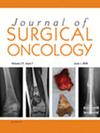Evaluating the Role of an Objective Lower Gastrointestinal Assessment as Part of ERAS Pathway Following hRAMIE
Abstract
Background
Postoperative esophagram is commonly employed following hybrid robotic-assisted minimally invasive esophagectomy (hRAMIE) to assess proper gastric conduit emptying. However, we hypothesize that the passage of enteric contents through the entire gastrointestinal tract is equally critical for patient recovery. This study aims to assess the utility of lower gastrointestinal contrast studies—such as jejunostomy tube imaging and abdominal X-rays—as part of the enhanced recovery after surgery (ERAS) pathway following hRAMIE for esophageal cancer.
Methods
This retrospective study evaluated 139 patients who underwent hRAMIE between September 2018 and November 2024, following completion of neoadjuvant chemoradiotherapy for esophageal cancer. Inclusion criteria consisted of patients with confirmed stage T2 or higher esophageal cancer who had completed chemoradiotherapy. Exclusion criteria included patients requiring emergency surgery or those with metastatic disease. All patients received a routine postoperative Day 2 esophagram in addition to a lower gastrointestinal assessment. The primary outcomes were length of hospital stay, time to nasogastric tube removal, return of bowel function, time to initiation of oral intake, and time to initiation of jejunostomy tube feeds.
Results
Patients with normal postoperative esophagrams demonstrated a significantly shorter time to first oral intake, reduced hospital length of stay, and quicker removal of the nasogastric tube. In contrast, lower gastrointestinal radiography, including jejunostomy contrast studies and abdominal X-rays, did not significantly impact early postoperative outcomes, with the exception of a prolonged time to first oral intake in patients with abnormal lower gastrointestinal findings.
Conclusion
The inclusion of radiographic jejunostomy contrast studies did not significantly affect key postoperative outcomes, such as length of stay, time to nasogastric tube removal, return of bowel function, or initiation of jejunostomy tube feeds. However, abnormal lower gastrointestinal studies were associated with delayed oral intake. Based on these findings, we do not recommend including lower gastrointestinal studies in routine incorporation into institutional ERAS protocols for esophagectomy.

 求助内容:
求助内容: 应助结果提醒方式:
应助结果提醒方式:


